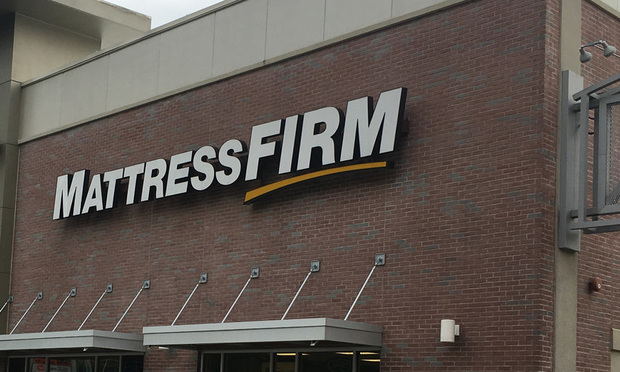Atlanta Real Estate Brokerage at Center of Kickback Claims by Texas-based Mattress Firm
An Atlanta real estate brokerage and one of its top executives face claims that they unjustly enriched themselves and two Mattress Firm executives through a massive, long-running kickback scheme that allegedly defrauded Mattress Firm of millions.
November 14, 2017 at 01:29 PM
6 minute read
 Mattress Firm store (Photo: John Disney/ ALM)
Mattress Firm store (Photo: John Disney/ ALM)
Atlanta attorneys representing defendants accused in a civil suit of orchestrating a massive bribery and kickback scheme that allegedly siphoned millions of dollars from the nation's largest retail mattress seller contend their clients were acting in good faith and will be exonerated before the case ever goes to trial.
But the suit—filed on behalf of Mattress Firm by John Thomas of Hicks Thomas in Houston—claims that two high-ranking company executives and Mattress Firm's Atlanta-based master real estate broker all have admitted their culpability.
The suit, filed Oct. 30 in Harris County District Court in Houston, alleges that Colliers Atlanta, an affiliate of global real estate brokerage Colliers International, and senior vice president Alexander Deitch arranged and delivered kickbacks to two key Mattress Firm executives from select developers across the country, some of whom are also defendants in the Texas case.
Those alleged kickbacks financed what the suit claims were increasingly lavish lifestyles of Bruce Levy, Mattress Firm's former vice president of real estate and construction, and Ryan Vinson, its now former senior vice president of real estate. Thomas said both executives were terminated last year.
According to the suit, just hours before their termination, Levy and Vinson allegedly admitted receiving thousands of dollars in cash, hundreds of thousands of dollars in loans, first-class trips to Europe, the Dominican Republic, London and Costa Rica, joint investment deals, expensive cases of wine, extravagant meals, luxury watches, diamond jewelry and gambling and shopping junkets. The trips, cash, loans, meals and merchandise were showered on the Mattress Firm executives in return for exerting their influence over Mattress Firm leases and locations recommended by Deitch at Colliers Atlanta, the suit claims.
It also contends that Deitch, just hours before Mattress Firm ended its business relationship with Colliers Atlanta, admitted that he had financed a number of trips, loans and merchandise for the two former Mattress Firm executives.
Kevin Ward, an attorney with Atlanta's Schulten Ward Turner & Weiss who is defending Deitch and two of Deitch's companies in the Texas suit, said Deitch denies the allegations. Deitch, he said, “worked in Mattress Firm's best interest in all relevant time periods, and he will absolutely fight this in the courts.”
Colliers issued a statement saying it “takes its professional and ethical obligations seriously” and “is not aware of any information to substantiate the specific allegations.”
Don Samuel of Atlanta's Garland, Samuel & Loeb, who represents Levy, said, “Everybody was acting in good faith, including my client.”
“There is no evidence,” Samuel continued, “that Mattress Firm was deceived about anything. This case, if it doesn't get dismissed, will settle long before it gets to trial.”
The Daily Report also contacted two Houston lawyers—Jed Silverman and Neal Davis—who are representing Vinson. Neither immediately responded to a request for comment.
Thomas said the suit stemmed from a tip the company received last year. Neither the suit nor Thomas specified how much Mattress Firm wants the defendants to disgorge, but Thomas said it's “millions.”
The suit alleges the kickback scheme was inaugurated after the hire of Levy in 2009 and Vinson in 2010. Levy, in turn, retained Deitch and Colliers Atlanta to arrange real estate rentals for Mattress Firm, which locates stores on properties developed and owned by independent real estate developers.
According to the suit, leases were arranged on Mattress Firm's behalf with developers willing to “pay to play.” Those leases generated the revenues that supported the alleged kickback payments.
As part of the alleged scheme, Levy, Vinson and Deitch promoted new locations for Mattress Firm stores with new, more expensive and longer leases by presenting “falsely optimistic sales forecasts to Mattress Firm management to maximize the stores that would be opened and to justify the above-market rents and longer lease terms that were offered to the developer defendants,” the suit said.
In addition, Levy permitted Deitch to secretly own a number of the stores that were then leased to Mattress Firm at premium rates, the suit contends. Through his private investment firm and real estate company, Deitch would buy properties he would then recommend to Mattress Firm, but only after assigning a developer to hold the property and act as a front in signing leases, the suit claims. Those leases were frequently set at above market rates and with terms longer than the maximum allowed by Mattress Firm, the suit said.
The suit also claims that Levy permitted Deitch to charge “phony development fees” and brokerage fees as high as $50,000 that were “secretly incorporated into the rental” for each affected store.
The alleged scheme helped to make Deitch one of Colliers' top producers, making the real estate brokerage firm “a direct beneficiary” of the alleged fraud, the suit claims.
Despite the alleged kickback costs, the developers—as well as Deitch—benefited financially, according to the suit. Higher rents with more generous lease terms increased the value of the developers' properties, allowing developers to flip the properties for millions of dollars in profits within weeks or months of signing a Mattress Firm lease agreement, the suit contends.
Levy and Deitch also joined in investments, a number of which involved Mattress Firm stores, without disclosing them to Mattress Firm, the suit claims.
Mattress Firm contends that, as a result of its former executives' alleged willingness to allocate business to real estate brokers and developers who showered them with bribes, Mattress Firm opened hundreds of unnecessary stores or harmed sales of existing nearby stores, according to the suit.
“The higher the rent and the longer the lease duration, the more valuable the deal was for the developer and the more costly it was for Mattress Firm,” the suit claims.
This content has been archived. It is available through our partners, LexisNexis® and Bloomberg Law.
To view this content, please continue to their sites.
Not a Lexis Subscriber?
Subscribe Now
Not a Bloomberg Law Subscriber?
Subscribe Now
NOT FOR REPRINT
© 2025 ALM Global, LLC, All Rights Reserved. Request academic re-use from www.copyright.com. All other uses, submit a request to [email protected]. For more information visit Asset & Logo Licensing.
You Might Like
View All
12-Partner Team 'Surprises' Atlanta Firm’s Leaders With Exit to Launch New Reed Smith Office
4 minute read
After Breakaway From FisherBroyles, Pierson Ferdinand Bills $75M in First Year
5 minute read
On the Move: Freeman Mathis & Gary Adds Florida Partners, Employment Pro Joins Jackson Lewis
6 minute readTrending Stories
Who Got The Work
J. Brugh Lower of Gibbons has entered an appearance for industrial equipment supplier Devco Corporation in a pending trademark infringement lawsuit. The suit, accusing the defendant of selling knock-off Graco products, was filed Dec. 18 in New Jersey District Court by Rivkin Radler on behalf of Graco Inc. and Graco Minnesota. The case, assigned to U.S. District Judge Zahid N. Quraishi, is 3:24-cv-11294, Graco Inc. et al v. Devco Corporation.
Who Got The Work
Rebecca Maller-Stein and Kent A. Yalowitz of Arnold & Porter Kaye Scholer have entered their appearances for Hanaco Venture Capital and its executives, Lior Prosor and David Frankel, in a pending securities lawsuit. The action, filed on Dec. 24 in New York Southern District Court by Zell, Aron & Co. on behalf of Goldeneye Advisors, accuses the defendants of negligently and fraudulently managing the plaintiff's $1 million investment. The case, assigned to U.S. District Judge Vernon S. Broderick, is 1:24-cv-09918, Goldeneye Advisors, LLC v. Hanaco Venture Capital, Ltd. et al.
Who Got The Work
Attorneys from A&O Shearman has stepped in as defense counsel for Toronto-Dominion Bank and other defendants in a pending securities class action. The suit, filed Dec. 11 in New York Southern District Court by Bleichmar Fonti & Auld, accuses the defendants of concealing the bank's 'pervasive' deficiencies in regards to its compliance with the Bank Secrecy Act and the quality of its anti-money laundering controls. The case, assigned to U.S. District Judge Arun Subramanian, is 1:24-cv-09445, Gonzalez v. The Toronto-Dominion Bank et al.
Who Got The Work
Crown Castle International, a Pennsylvania company providing shared communications infrastructure, has turned to Luke D. Wolf of Gordon Rees Scully Mansukhani to fend off a pending breach-of-contract lawsuit. The court action, filed Nov. 25 in Michigan Eastern District Court by Hooper Hathaway PC on behalf of The Town Residences LLC, accuses Crown Castle of failing to transfer approximately $30,000 in utility payments from T-Mobile in breach of a roof-top lease and assignment agreement. The case, assigned to U.S. District Judge Susan K. Declercq, is 2:24-cv-13131, The Town Residences LLC v. T-Mobile US, Inc. et al.
Who Got The Work
Wilfred P. Coronato and Daniel M. Schwartz of McCarter & English have stepped in as defense counsel to Electrolux Home Products Inc. in a pending product liability lawsuit. The court action, filed Nov. 26 in New York Eastern District Court by Poulos Lopiccolo PC and Nagel Rice LLP on behalf of David Stern, alleges that the defendant's refrigerators’ drawers and shelving repeatedly break and fall apart within months after purchase. The case, assigned to U.S. District Judge Joan M. Azrack, is 2:24-cv-08204, Stern v. Electrolux Home Products, Inc.
Featured Firms
Law Offices of Gary Martin Hays & Associates, P.C.
(470) 294-1674
Law Offices of Mark E. Salomone
(857) 444-6468
Smith & Hassler
(713) 739-1250







